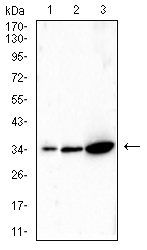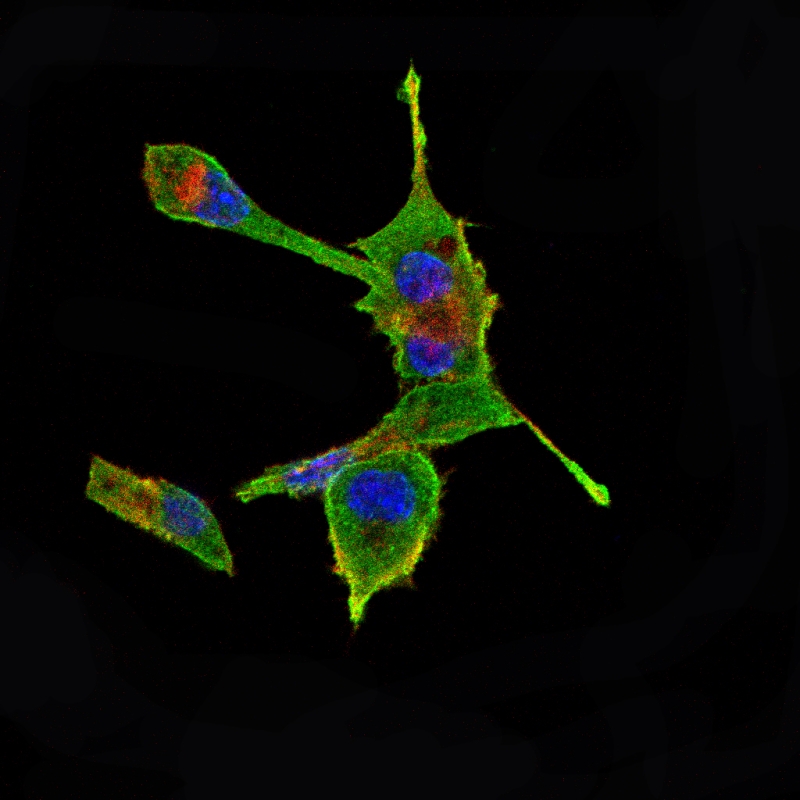

| WB | 1/500-1/1000 | Human,Mouse,Rat |
| IF | 咨询技术 | Human,Mouse,Rat |
| IHC | 咨询技术 | Human,Mouse,Rat |
| ICC | 1/200 - 1/1000 | Human,Mouse,Rat |
| FCM | 咨询技术 | Human,Mouse,Rat |
| Elisa | 1/10000 | Human,Mouse,Rat |
| Aliases | Aldesleukin; TCGF; interleukin-2 |
| Entrez GeneID | 3558 |
| clone | 8D5 |
| WB Predicted band size | 17.6kDa |
| Host/Isotype | Mouse IgG1 |
| Antibody Type | Primary antibody |
| Storage | Store at 4°C short term. Aliquot and store at -20°C long term. Avoid freeze/thaw cycles. |
| Species Reactivity | Human,Mouse,Rat |
| Immunogen | Purified recombinant fragment of IL2 expressed in E. Coli. |
| Formulation | Purified antibody in PBS with 0.05% sodium azide. |
+ +
以下是3篇关于IL-2抗体的代表性文献信息(内容经概括整理):
1. **"Selective targeting of engineered T cells using orthogonal IL-2 cytokine-receptor complexes"**
- **作者**: Sockolosky JT 等
- **摘要**: 开发了一种工程化IL-2抗体融合蛋白,通过改造IL-2与其受体结合域,实现选择性激活特定T细胞亚群,减少全身毒性,为肿瘤免疫治疗提供新策略。
2. **"An IL-2 antibody selectively expands regulatory T cells in vivo via cytokine receptor-directed binding"**
- **作者**: Boyman O 等
- **摘要**: 报道了一种靶向IL-2的单克隆抗体,通过优先结合高亲和力IL-2受体(CD25),特异性扩增调节性T细胞(Treg),在自身免疫疾病模型中显示治疗潜力。
3. **"Antibody-mediated delivery of interleukin-2 to the tumor microenvironment confers potent antitumor activity"**
- **作者**: Klein C 等
- **摘要**: 设计了一种肿瘤靶向IL-2抗体偶联物(ADC),通过抗体引导IL-2至肿瘤微环境,增强效应T细胞活性并降低全身副作用,在小鼠模型中显著抑制肿瘤生长。
4. **"IL-2 receptor signaling pathway governs antibody-mediated cancer therapy"**
- **作者**: Waldmann TA 等
- **摘要**: 系统综述IL-2受体信号在抗体治疗中的作用,提出阻断IL-2Rα(CD25)的抗体可抑制Treg功能,从而增强抗PD-1/CTLA-4等免疫检查点抑制剂的疗效。
(注:以上内容基于公开研究提炼,实际引用需核对原文)
Interleukin-2 (IL-2) is a cytokine critical for immune regulation, primarily produced by activated T cells. It plays dual roles: promoting effector T cell proliferation and differentiation to enhance immune responses, while also regulating immune tolerance by supporting regulatory T cell (Treg) function. IL-2 binds to a receptor complex comprising CD25 (IL-2Rα), CD122 (IL-2Rβ), and CD132 (γc), with high-affinity binding requiring CD25.
IL-2 antibodies are tools or therapeutics targeting IL-2 or its receptors. In research, monoclonal antibodies against IL-2 or its subunits are used to detect or neutralize IL-2 in assays (e.g., ELISA, flow cytometry) to study immune pathways. Therapeutically, IL-2 pathway modulation has been explored in autoimmune diseases, transplantation, and cancer. For example, antibodies like basiliximab and daclizumab block CD25 to inhibit IL-2 signaling, reducing T cell activation in organ transplant rejection or autoimmune conditions. Conversely, engineered IL-2 variants or agonist antibodies (e.g., ALKS 4230) aim to selectively stimulate effector T cells or NK cells, enhancing antitumor immunity while minimizing Treg activation.
Despite its potential, IL-2 therapy faces challenges due to its pleiotropic effects and toxicity. Antibody-based strategies seek to improve specificity, reduce side effects, and optimize clinical outcomes, reflecting ongoing efforts to harness IL-2 biology for precision immunotherapy.
×